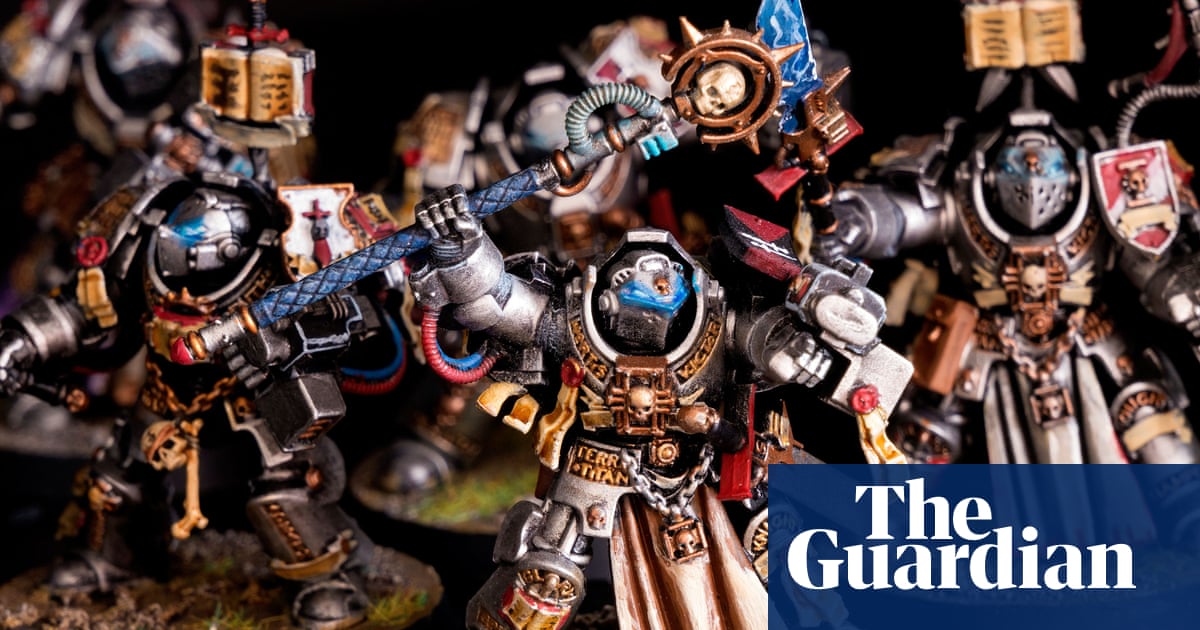Warhammer maker Games Workshop hands staff £5,000 bonus after lockdown sales surge
Show caption The Grey Knight Terminator army battle group, part of Games Workshop’s hand-painted Warhammer 40,000 miniature figures series. Photograph: Alamy Stock Photo Retail industry Warhammer maker Games Workshop hands staff £5,000 bonus after lockdown sales surge UK firm praises workers for ‘exceptional performance’ during pandemic after sales rose more than a third Sarah Butler @whatbutlersaw Tue 27 Jul 2021 14.08 BST Share on Facebook
Share on Twitter
Share via Email
Warhammer retailer Games Workshop is handing its shop workers, model makers, designers and support staff a £5,000 bonus each after sales and profits benefited from tabletop gamers escaping lockdown by fighting bloodthirsty battles with orcs, elves and alien hordes.
The Nottingham-based company behind the popular fantasy gaming equipment and Lord of the Rings figurines said its 2,600 ordinary workers would split a £10.6m special bonus on top of a £2.6m profit share.
Senior managers will share an extra £1.1m bonus pot, up from £300,000 the year before, after sales rose by just over a third to £361m and pretax profits soared almost 70% to £151m.
The company has also cancelled business rates relief and other pandemic financial support from the government.
Kevin Rountree, the chief executive of Games Workshop, said the special bonuses were a reward for their “exceptional performance in helping to increase our profitability significantly”.
He added: “After a tough year we are delighted that the Warhammer hobby and Games Workshop are in great shape.”
Rountree said the latest edition of the group’s Warhammer 40,000 game, which features characters such as the skeleton-like Necron Warriors and the multi-limbed Canoptek Plasmacyte, had been the group’s “most successful launch to date”. A new Cursed City game, in which players try to liberate the populace from an undead ruler, had sold out quickly. Sales were particularly strong in the US.
Demand for the games remained strong despite its 523 stores around the world being forced to temporarily close through lockdowns – Games Workshop hosted online events and livestreamed seminars to replace its physical meet-ups.
He said social media engagement had risen by a quarter as new and older fans found new ways to engage with its games, which enjoy a cult following similar to the likes of Lego or Dungeons & Dragons.
David Kimberley, an analyst at investment platform Freetrade, said Games Workshop’s rising profits and efforts to return cash to shareholders had helped it outperform the UK stock market – on which it is now valued ahead of Marks & Spencer and on a par with fast-growing online fashion specialist Asos.
“Clearly Games Workshop has been given a boost by lockdown and our need to find something to busy ourselves with,” he said.
“There’s also reason to believe these sales numbers won’t be a short-term bump. Warhammer fans tend to be sticky customers and regular spenders, which is part of what has made the company so successful.”
Games Workshop, which has two factories in Nottingham, said it had brought in permanent night shifts and some additional weekend shifts and also rented a second warehouse nearby as it tried to sate demand. The group is also installing extra injection-moulding kit to speed up production of its figurines, which can cost anywhere between £10 and £100-plus, and has also bought two pieces of land beside its main site for further expansion.
Rountree admitted that customers in the UK and Europe had experienced an increase in delivery delays because of “capacity constraints” at its warehouses, partly as a result of social distancing measures to protect workers from the spread of Covid-19.
Deliveries from the UK to the EU also faced “significant disruption” in the early part of this year as a result of Brexit. “The world seems to be getting smaller but crossing borders is much harder,” Rountree said.
However, Charles Hall, an analyst at Peel Hunt said the group’s operating profit margin had increased from 33% to nearly 43% as the popularity of its figurines, made from either plastic or resin, had increased. “They are benefiting from 40 years of creativity and intellectual property and investing in people and the miniatures,” he said.
The group said it had permanently closed just eight stores, including two in the UK, over the past year and planned to open 10 more a year in the US as well as Warhammer Cafes in Japan and China.
The firm is also bringing in Chinese and Russian translation teams next year to help improve access to its products around the world and expanding its presence in books, video games and animation.













